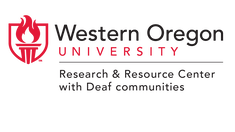|
I first volunteered at a weekend DeafBlind camp on the side of Mt. Hood near Sandy, Oregon in the fall of 1992. I remember having perhaps my first and only panic attack on the way up driving past snow. I was starting to freak out, thinking “I’ve only been studying sign language for a year! How am I going to guide or interpret with DeafBlind people in the snow?!” My friends calmed me down, and I made it through the weekend. All the DeafBlind people lived. I remember one moment during the weekend when I was matched with a DeafBlind senior citizen who was wearing overalls. They were announcing the winners of the costume contest and the person I was interpreting for won for Best Overall (people thought it meant, Best Overalls.” A more seasoned interpreter saw that I wasn’t getting the message across and asked if I needed help and he intervened. I was grateful because the goal of that man getting the message that he won was getting across more swiftly than I could have. After that weekend, I wasn’t sure volunteering in the DeafBlind community was right for me, but my friends and I returned the next spring to the weekend camp on the Oregon Coast. I think that was the camp that cemented my volunteerism as a passion for me. I had a lot of fun with other volunteers and met some pretty interesting and dynamic DeafBlind people too. I saw the magic that transpires when this community comes together and I was hooked. From there, I sought out an interpreting internship with more opportunity to be in the DeafBlind community in the Bay Area. I continued to volunteer at the Oregon camps through the mid 1990’s until money ran out and the camps couldn’t operate any longer. I had heard about Seabeck, the DeafBlind Retreat that had been operating for decades (now almost 40 years) in the Olympic peninsula of Washington State. The week-long retreat accommodated 80 DeafBlind folks and 150 volunteers. I first went in 1998. I was excited to see many of the same DeafBlind individuals and volunteers who had come down by bus for the Oregon DeafBlind camps. I started working for the Western Region Interpreter Education Center grant at Western Oregon University in 2007. I heard about service-learning as an opportunity for students to apply their studies through meaningful community service with instruction and reflection and thought about how Western was well-positioned to collaborate with the DeafBlind community, a community always in search of qualified, ASL-fluent interpreters and sighted guides. I began to reach out to the Seattle DeafBlind community leaders and initiate a relationship. I’d been away from active volunteering in the community for a decade and there were new faces and I wanted to work to create a project with students to train them. Soon after our relationship was underway, Seattle Central Community College’s interpreter program was disbanded and building that relationship was even more valuable especially as many Western students hail from Washington. In the 12 years since I first taught Western students about DeafBlind interpreting and guiding, 135 students have gone to volunteer at Seabeck. These students have been hearing, Deaf or hard of hearing. Many students have found their spiritual home and community at Seabeck and return year after year to volunteer now on their own, as they have built their own relationships with DeafBlind community members and other volunteers. Western has also built a strong relationship with the active volunteer organization, WSDBC, the Washington State DeafBlind Citizens. This group has quarterly meetings and works with us to provide volunteers so that their members can actively plan and engage in their community. I’m proud of the way we work to show up. Aware of our privilege and power and working to affirm each DeafBlind individual’s dignity, worth and right to access and information through touch. This partnership is a journey we are on with WSDBC, the DeafBlind Service Center, and The Lighthouse for the Blind which plans the Seabeck Retreat, and we strive to honor the DeafBlind community’s experience first in. We see how much value and learning is gained and because of this relationship, we are better able to prepare our graduates to go on and work with other DeafBlind individuals and pursue their passions with this community. I continue to be amazed at how opportunities have opened up for interpreters to work with DeafBlind individuals, traveling for conferences, cruises, workshops, and the like. Witnessing students who are no longer students in most cases using ProTactile ASL and being open to how to grow and learn more is a wonderful affirmation that the relationship we continue to build and work on is worthwhile. -CM Hall CM HALLCM Hall, Ed.M., NIC Advanced, EIPA K-12, is the DBI Project Manager. CM has volunteered in the DeafBlind community since 1992 and created an academic service-learning project for ASL-fluent students to engage with the DeafBlind community, partnering with the Washington State DeafBlind Citizens organization and the annual Seabeck DeafBlind Retreat. |

 RSS Feed
RSS Feed
